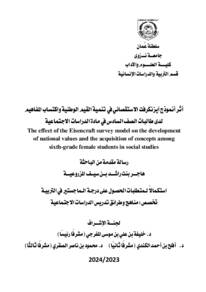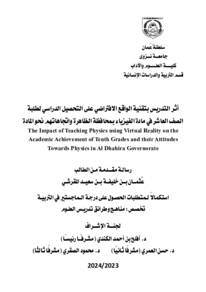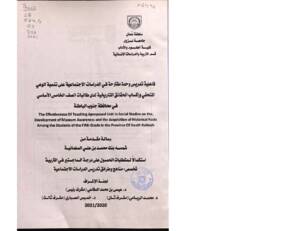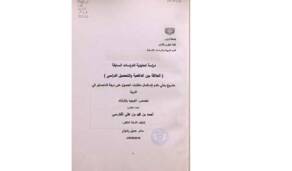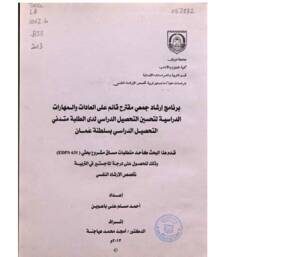وثيقة
أثر استخدام التقويم الذاتي في الدراسات الاجتماعية على التحصيل والتفكير التأملي لدى طالبات الصف العاشر الأساسي.
عناوين أخرى
The effect of using self-assessment in social studies on achievement and reflective thinking of students in the basic tenth grade
الناشر
جامعة السلطان قابوس.
ميلادي
2020
اللغة
العربية
الملخص الإنجليزي
This study aimed to investigate the effect of using self assessment in the achievement and reflective thinking in social studies.
The researcher used quasi-experimental design. The sample consisted
of (63) students of tenth grade in the basic education schools in the
Northern Sharqiya. The sample was divide into two equal groups: an
experimental group (32 students), and a control group (31 students). To
achieve the objectives of the study, the researcher used two instruments
to collect data: an achievement test and a reflective thinking test to
measure the effect of self- assessment on achievement and reflective
thinking. To verify the validity of the test, it was presented to a group of
arbitrators. The stability was calculated using the alpha coefficient of
Cronbach's alpha which was (0.779) for the achievement test and
(0.748) for the reflective thinking test.The results of the study showed
statistically significant differences at the level of (α ≤ 0.05) between the
mean of the students' scores of the experimental group and controlled
group in the achievement post-test and reflective thinking post-test in
the favor of the experimental group.The study recommended that
students should be trained to use methods of self-assessment to judge
their performance, involve them in setting the criteria upon which they
are evaluated, and introduce self- assessment in addition to the
approved official assessment in social studies.
المجموعة
URL المصدر
الملخص العربي
هدفت الدراسة إلى الكشف عن أثر التقويم الذاتي في التحصيل والتفكير التأملي في مادة الدراسات الاجتماعية، حيث استخدمت الباحثة المنهج شبه التجريبي، وتكونت عينة الدراسة من (63) طالبة من طالبات الصف العاشر الأساسي في محافظة شمال الشرقية بسلطنة عمان، تم تقسيمهن إلى مجموعتين، التجريبية وعددها (32) طالبة، والضابطة وعددها (31) طالبة.
ولتحقيق أهداف الدراسة استخدمت الباحثة أداتين لجمع البيانات، وهما: اختبار التحصيل الدراسي، واختبار التفكير التأملي، وكلاهما لقياس أثر المتغير المستقل وهو التقويم الذاتي على المتغيرين التابعين وهما التحصيل الدراسي والتفكير التأملي. وللتأكد من الصدق الظاهري للاختبارين تم عرضهما على مجموعة من المحكمين، أما الثبات فقد تم حسابه باستخدام معامل ألفا كرونباخ، حيث بلغت قيمته في اختبار التحصيل الدراسي (0,779)، وأما في اختبار التفكير التأملي فقد بلغت قيمته (0,748).
وقد توصلت الدراسة إلى وجود فروق ذات دلالة إحصائية عند مستوى الدلالة (? ? 0.05) بين متوسط درجات الطالبات في الاختبار التحصيلي البعدي، وفي اختبار التفكير التأملي البعدي لصالح المجموعة التجريبية.
وأوصت الدراسة إلى ضرورة تدريب الطلاب على استخدام اساليب التقويم الذاتي للحكم على أدائهم، واشراكهم في وضع المعايير التي يتم تقييمهم وفقاً عليها، وادخال التقويم الذاتي إلى جانب التقويم الرسمي المعتمد لمادة الدراسات الإجتماعية.
ولتحقيق أهداف الدراسة استخدمت الباحثة أداتين لجمع البيانات، وهما: اختبار التحصيل الدراسي، واختبار التفكير التأملي، وكلاهما لقياس أثر المتغير المستقل وهو التقويم الذاتي على المتغيرين التابعين وهما التحصيل الدراسي والتفكير التأملي. وللتأكد من الصدق الظاهري للاختبارين تم عرضهما على مجموعة من المحكمين، أما الثبات فقد تم حسابه باستخدام معامل ألفا كرونباخ، حيث بلغت قيمته في اختبار التحصيل الدراسي (0,779)، وأما في اختبار التفكير التأملي فقد بلغت قيمته (0,748).
وقد توصلت الدراسة إلى وجود فروق ذات دلالة إحصائية عند مستوى الدلالة (? ? 0.05) بين متوسط درجات الطالبات في الاختبار التحصيلي البعدي، وفي اختبار التفكير التأملي البعدي لصالح المجموعة التجريبية.
وأوصت الدراسة إلى ضرورة تدريب الطلاب على استخدام اساليب التقويم الذاتي للحكم على أدائهم، واشراكهم في وضع المعايير التي يتم تقييمهم وفقاً عليها، وادخال التقويم الذاتي إلى جانب التقويم الرسمي المعتمد لمادة الدراسات الإجتماعية.
قالب العنصر
الرسائل والأطروحات الجامعية



